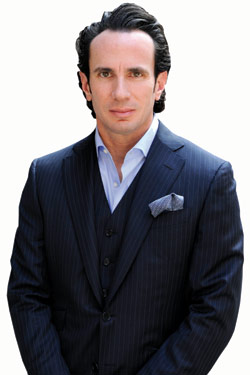 |
Known best as a celebrity divorce lawyer, Robert Wallack’s assertive and passionate representation has earned him a place in the spotlight. He frequently provides legal analysis for national television outlets ranging from “The Today Show” to “The View.” Behind the scenes, he is the legal consultant to “General Hospital,” a contributor to The Huffington Post, and serves as an adjunct professor at Seton Hall Law School and a trial advocacy instructor at Cardozo Law School.
After earning his J.D., Wallack spent four years as a Manhattan assistant district attorney, where he led several high-profile prosecutions. Once in the private sector, Wallack pursued a career in family law because it allowed him to continue his work in the courtroom—and to have a direct and lasting impact on his clients’ lives. “The breakup of a marriage is arguably one of the most difficult life experiences a person has,” Wallack explains. “My job is to help my clients through this difficult time and to ensure that they get everything they’re entitled to.”
In 2007, he founded The Wallack Firm, P.C., which specializes in complex and high-net worth family and matrimonial law cases. “We have a reputation for being smart, strategic and aggressive lawyers,” Wallack says. They also have fun; his team strategizes cases around their conference room ping-pong table. “We are the next generation of matrimonial lawyers, and we try to think outside the box when it comes to our clients’ matters.”
That may be why Wallack has handled cases for prominent entertainment, fashion, and sports celebrities. He’s working on more child custody cases where parental alienation exists and is prevalent. Wallack says: “Studies show that some form of alienating behavior is present in 90% of high-conflict divorce cases. This growing problem requires attention and must be tackled.”
Wallack believes alienation has gained recognition among experts, lawyers and courts who were long-unprepared for the problem. And, many courts are now willing to combat the issue head-on, thanks in part to the success Wallack has achieved in the courtroom.
“Studies show that some form of alienating behavior is present in 90% of high-conflict divorce cases. This growing problem requires attention and must be tackled.”
One significant alienation case of his involved an Orthodox Jewish family and an intense 45-day trial. The mother used religion as a tool to drive a wedge between the father and his children. “She tried to convince the children that because their father no longer shared their religious beliefs, he was somehow bad, unworthy of their love, and that he had abandoned them,” Wallack recalls. He was able to demonstrate that the father’s change in faith was not the real reason his children rejected him, but rather it was the mother who orchestrated the destruction of the father-child relationship. Indeed, the father actually stopped practicing the religion during the marriage, while he lived with his children and continued to enjoy the same loving relationship he’d always had with them. “It wasn’t until the father decided to divorce the mother, that the mother used religion, among other things, to poison that relationship,” Wallack says.
Wallack proved the mother was alienating the parties’ 17-year-old son from their father and got the court to take swift and decisive measures to combat the alienation. “It was somewhat of a ground-breaking trial decision, because previously courts didn’t usually step in and take action with a child that old,” Wallack said. This was one of several hotly-contested trials where Wallack proved that a custodial parent was engaging in alienating behavior.Wallack’s firm has also achieved remarkable financial results for its clients, both through settlement and after trial. Some of these cases involved non-working spouses, for whom Wallack was able to secure significant support packages and high distributive awards. His firm also often represents the wealthier or “monied” spouse, where asset protection is a top concern.
His strong desire to win while doing the best work possible motivates Wallack most. “We pour our hearts, souls and all our energy into these cases,” Wallack says. “I don’t think there’s any better feeling professionally than winning a hard-fought case, whether it’s achieving a spectacular result in a negotiated settlement or winning at trial. It’s like walking on air.”